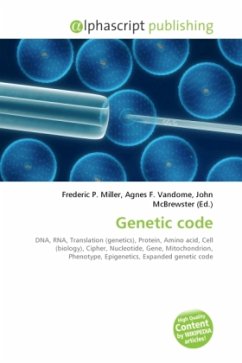The genetic code is the set of rules by which information encoded in genetic material (DNA or RNA sequences) is translated into proteins (amino acid sequences) by living cells. A more precise term for the concept might be "genetic cipher". The code defines a mapping between tri-nucleotide sequences, called codons, and amino acids. A triplet codon in a nucleic acid sequence usually specifies a single amino acid (though in some cases the same codon triplet in different locations can code unambiguously for two different amino acids, the correct choice at each location being determined by context). Because the vast majority of genes are encoded with exactly the same code (see the RNA codon table), this particular code is often referred to as the canonical or standard genetic code, or simply the genetic code, though in fact there are many variant codes. Thus the canonical genetic code is not universal. For example, in humans, protein synthesis in mitochondria relies on a genetic code that varies from the canonical code. It is important to know that not all genetic information is stored using the genetic code.
Bitte wählen Sie Ihr Anliegen aus.
Rechnungen
Retourenschein anfordern
Bestellstatus
Storno








